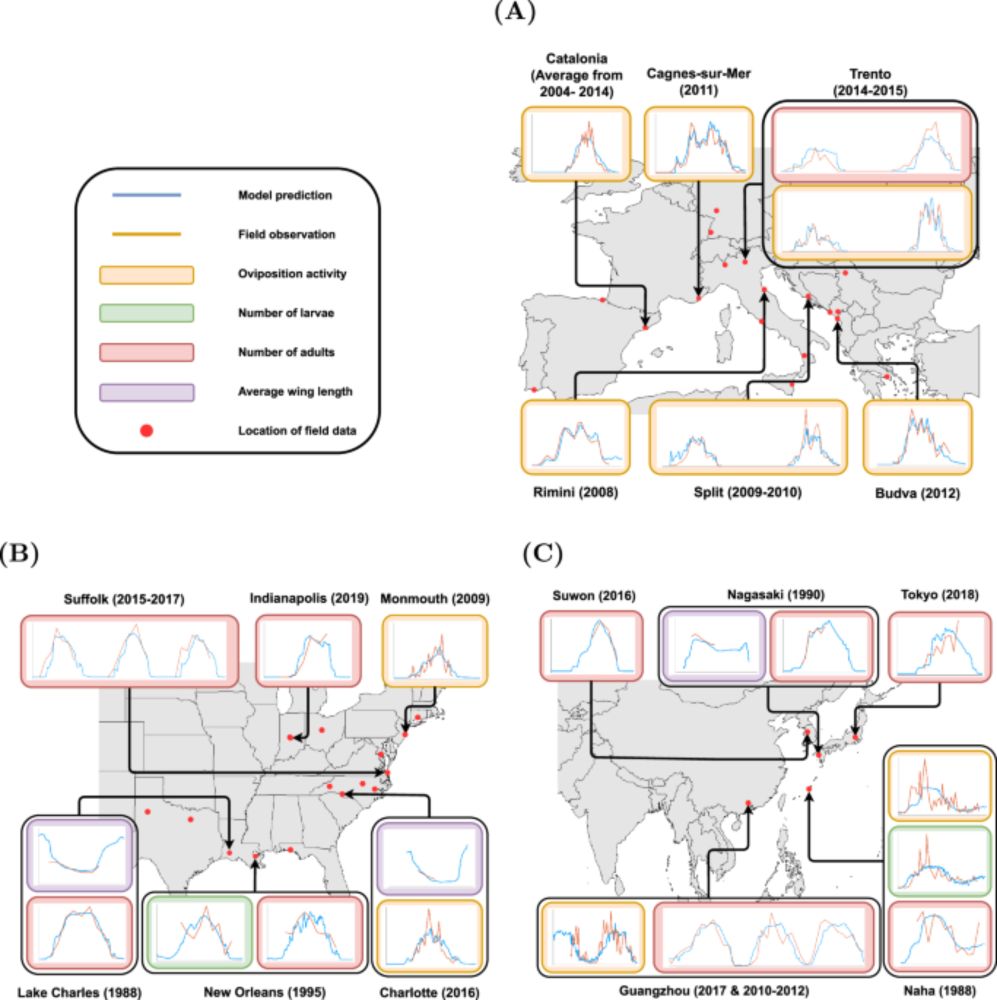
Dr Steven White
@drstevenmwhite.bsky.social
Vector-borne disease modelling in humans, animals and plants at UKCEH (https://bsky.app/profile/ukceh.bsky.social). Currently working on mosquitoes 🦟, ticks 🕷️ and Xylella fastidiosa 🦠.
This is the model working for DENV. I can't publicly share the CHIKV stuff yet. onlinelibrary.wiley.com/doi/full/10....

Modelling the Lodi, 2023 and Fano 2024, Italy Dengue Outbreaks: The Effects of Control Strategies and Environmental Extremes
Autochthonous cases of dengue in Europe are increasing. In 2023 (Lodi province) and 2024 (Fano, Pesaro and Urbino province), Italy saw the largest modern dengue outbreaks to date. Public health measu....
onlinelibrary.wiley.com
October 16, 2025 at 9:39 AM
This is the model working for DENV. I can't publicly share the CHIKV stuff yet. onlinelibrary.wiley.com/doi/full/10....
FYI, we have a really good albopictus-CHIKV/DENV model that can predict outbreaks accurately (papers in review/prep), if of interest. At least, they work well in Europe.
October 16, 2025 at 9:22 AM
FYI, we have a really good albopictus-CHIKV/DENV model that can predict outbreaks accurately (papers in review/prep), if of interest. At least, they work well in Europe.
Yes, but nowhere near to the same severity. Something like ~32 autochthonous cases <2024 and ~729 autochthonous cases in 2025 so far!!
October 16, 2025 at 9:15 AM
Yes, but nowhere near to the same severity. Something like ~32 autochthonous cases <2024 and ~729 autochthonous cases in 2025 so far!!
Just look what's going on in France this year...!
October 16, 2025 at 8:09 AM
Just look what's going on in France this year...!
Oh those are spectacular! My socks have bikes on them.
October 1, 2025 at 1:36 PM
Oh those are spectacular! My socks have bikes on them.
@ukceh.bsky.social; @iapetusdtp.bsky.social; @uofglasgow.bsky.social; @ecdc.europa.eu; @ukhsa.bsky.social; @globalvectorhub.bsky.social
September 24, 2025 at 3:14 PM
We highly the use of such models for future use in real-time European Aedes-borne disease outbreaks.
September 24, 2025 at 3:14 PM
We highly the use of such models for future use in real-time European Aedes-borne disease outbreaks.
We show that control strategies can be highly effective in reducing dengue cases. However, extreme precipitation events may have also had a large contribution to reducing the number of cases for one of the outbreaks.
September 24, 2025 at 3:14 PM
We show that control strategies can be highly effective in reducing dengue cases. However, extreme precipitation events may have also had a large contribution to reducing the number of cases for one of the outbreaks.
Using out state-of-the-art Aedes albopictus-dengue model (www.nature.com/articles/s41...), we predict the control efficacy for two recent large Italian dengue outbreaks.

Role of vector phenotypic plasticity in disease transmission as illustrated by the spread of dengue virus by Aedes albopictus - Nature Communications
There is a need for accurate models to predict disease dynamics by considering the interactions between environment and vector traits. This study finds that incorporating delayed phenotypic plasticity in mosquito traits significantly enhances the accuracy of dengue risk predictions.
www.nature.com
September 24, 2025 at 3:14 PM
Using out state-of-the-art Aedes albopictus-dengue model (www.nature.com/articles/s41...), we predict the control efficacy for two recent large Italian dengue outbreaks.

